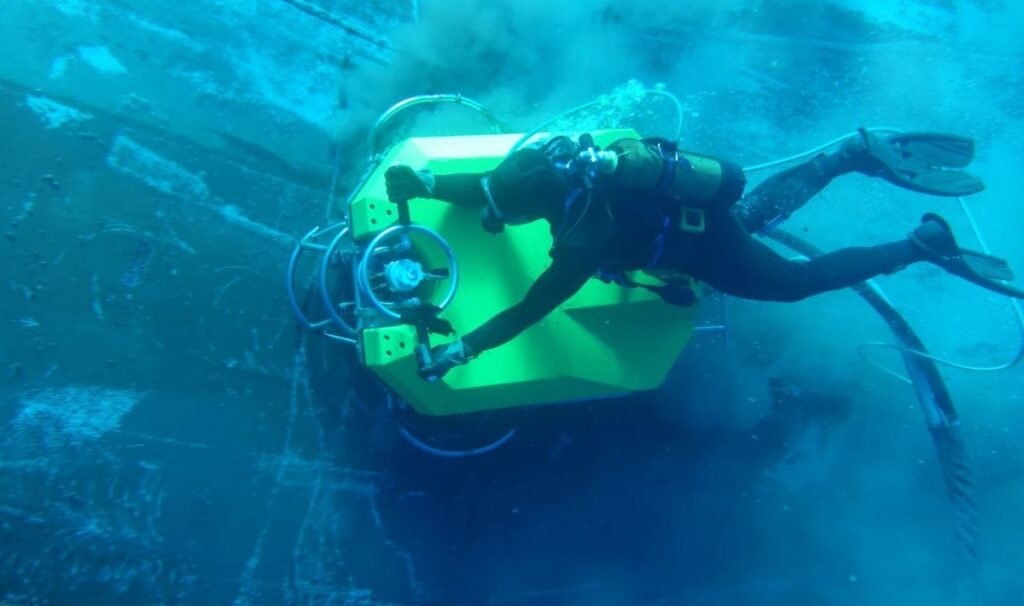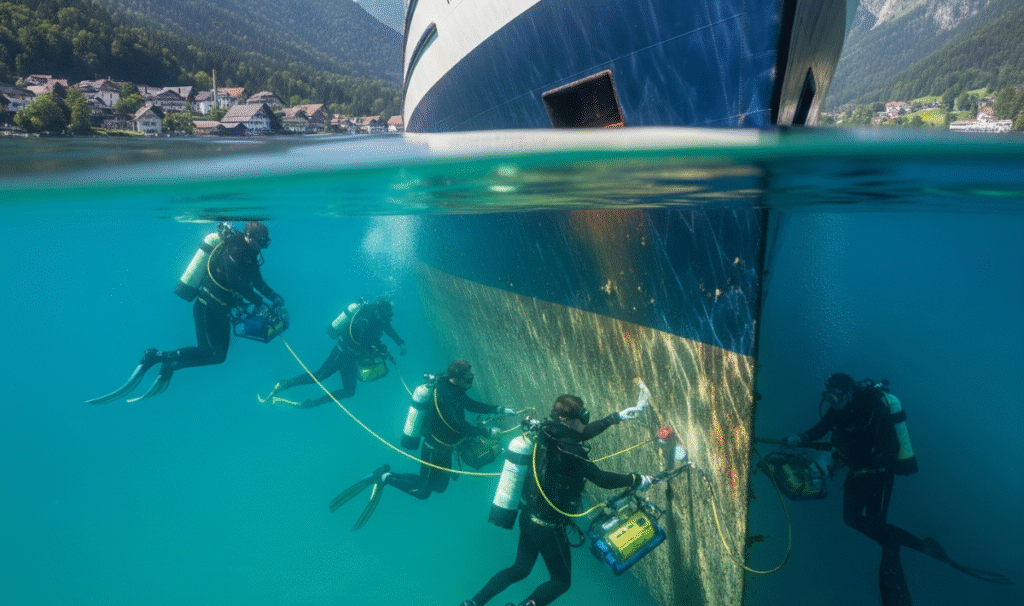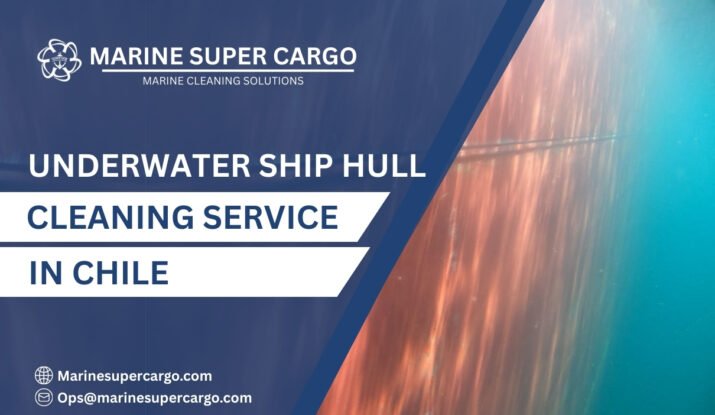Imagine your ship cutting through the Chilean waters like a sleek dolphin—fast, smooth, and effortlessly. But what if your vessel’s hull is covered with stubborn marine growth, like barnacle armor or slippery algae? That drag slows you down, burns more fuel, and costs you hard-earned money. That’s where underwater ship hull cleaning in Chile comes into play, a specialized service that keeps ships gliding efficiently across the waves.
Introduction to Underwater Ship Hull Cleaning in Chile
Underwater ship hull cleaning in Chile is the process of removing biofouling—marine organisms like barnacles, algae, and other sea life—that build up on the submerged parts of a ship. In Chile, with its long coastline and bustling ports like Valparaiso and Arica, underwater ship hull cleaning is vital for maintaining optimal ship performance. This cleaning happens without dry docking, using professional divers or remotely operated vehicles (ROVs). It’s a timely, cost-saving solution for ship owners and operators.
Why Underwater Ship Hull Cleaning in Chile is Essential for Ships
Fuel Efficiency and Cost Savings
When your ship’s hull is fouled, it creates extra drag, like walking through water with a weighted backpack. This causes the engines to work harder, burning more fuel. Regular underwater ship hull cleaning in Chile reduces this drag, improving fuel economy significantly—sometimes by up to 15%. Given rising fuel prices, this can translate into thousands of dollars saved per voyage.

Marine Environmental Benefits
Cleaning the hull not only saves money but also helps protect the marine ecosystem. Biofouling organisms can transport invasive species when ships move between regions, disrupting local habitats. By maintaining clean hulls, vessel operators help reduce this risk, supporting Chile’s commitment to preserving its diverse marine life. Practices recommended by the International Maritime Organization (IMO) guide cleaning operations to ensure they are both effective and environmentally responsible, safeguarding Chile’s rich biodiversity while promoting sustainable maritime trade and global environmental stewardship.
Common Marine Growth and Biofouling on Ship Hulls
Types of Fouling Found in Chilean Waters
In Chile’s diverse coastal areas, you’ll often find barnacles, mussels, algae, and even calcareous buildup clinging to ship hulls. This mix creates a roughened surface that beefs up resistance against water flow. Without intervention, these organisms can speed up corrosion and damage the hull coating beneath.
Techniques and Technologies for Cleaning Hulls Underwater
Diver-Based Cleaning
In Chile, experienced commercial divers carry out underwater hull cleaning using specialized brushes, scrapers, and suction devices. Their expertise ensures marine growth is removed efficiently while preserving the vessel’s protective coatings, preventing costly damage. These operations are often conducted in line with MARPOL regulations, which aim to minimize pollution and protect marine environments. By following these international standards, diver-based cleaning not only boosts vessel performance but also supports Chile’s commitment to sustainable maritime operations and the protection of its coastal and oceanic ecosystems.
ROV (Remotely Operated Vehicle) Cleaning Systems
Some operators use ROVs equipped with rotary brushes or water jets. These underwater robots are perfect for quick, efficient cleaning jobs, especially in challenging or hazardous conditions.
Advanced Cleaning Tools and Materials
Brushes made from polypropylene, nylon, or stainless steel are typical, chosen for their abrasion resistance. Innovative tools like the Scamper system are approved globally for safely cleaning hulls protected by silicone or special anti-fouling paints without damaging them.
Leading Underwater Ship Cleaning in Chile
Chile’s underwater ship hull cleaning sector boasts experienced companies with roots in naval diving expertise. For example, Cleanship.Co specializes in underwater ship hull cleaning in Chile, propeller polishing, and other commercial diving services—all tailored to Chilean maritime needs.
Environmental Regulations and Best Practices in the Underwater Ship Hull Cleaning in Chile
Chile’s maritime authorities enforce stringent rules to reduce the environmental footprint of underwater ship hull cleaning. Service providers must follow strict waste containment and disposal protocols, ensuring no debris or pollutants enter the water. Cleaning schedules are often planned to align with sustainable shipping initiatives, helping reduce biofouling and invasive species transfer. Many operators also adopt international best practices promoted by organizations like the International Association of Ports and Harbors (IAPH), reinforcing Chile’s dedication to eco-friendly and responsible maritime operations.
How to Choose a Reliable Hull Cleaning Provider in Chile
To ensure top-quality service, look for providers with:
- Proven experience and certifications
- Skilled, professional divers
- Use of environment-friendly cleaning technologies
- Positive client testimonials and transparent pricing

Case Studies: Successful Underwater Ship Hull Cleaning in Chile Ports
In Chile’s bustling ports, such as Valparaíso, vessels maintained by skilled divers have seen remarkable gains in speed, maneuverability, and fuel efficiency following regular hull cleanings. These real-world results highlight how proactive maintenance reduces drag, lowers operating costs, and ensures compliance with environmental standards. Leading service providers, including CleanShip.co, deliver expert solutions backed by global best practices from the International Marine Contractors Association (IMCA). Such partnerships prove that routine underwater hull cleaning is both an economic advantage and a commitment to sustainable maritime operations in Chile.
Conclusion: Keeping Your Vessel Shipshape with Hull Cleaning in Chile
Let’s wrap this up—you want your ship to sail fast, consume less fuel, and last longer. Underwater ship hull cleaning in Chile is your secret weapon. It’s a routine that keeps your vessel sleek as a dolphin, slicing through the Pacific with ease. Regular cleaning, combined with the expertise of Chile’s best divers, ensures you save money and protect the environment. So, why wait? Dive into hull cleaning and watch your ship perform like never before.
FAQ:
Q1. How often should a ship’s hull be cleaned underwater in Chile?
Typically, ships undergo hull cleaning every 3 to 6 months, depending on their routes and fouling levels.
Q2. Is underwater sip hull cleaning safe for the ship’s paint and coating?
Yes, professional cleaners use approved tools and techniques designed to preserve anti-fouling coatings.
Q3. Can underwater ship hull cleaning improve a ship’s speed?
Absolutely! Removing biofouling reduces drag, enabling the ship to sail faster and more efficiently.
Q4. Do Chilean regulations affect underwater ship hull cleaning services?
Yes, there are strict protocols to ensure environmental safety and proper waste disposal during cleaning.
Q5. Are there any risks associated with underwater ship hull cleaning?
When performed by experienced divers using proper equipment, risks are minimal. Safety is a top priority.


